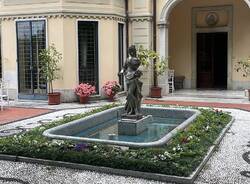Praise for the snail
In his lectio magistralis lecture, Serge Lautoche presented degrowth as a challenge for the future. The Napoleon Hall was full of guests of Kiwanis, of Insubria University, of ANCI and of the Order of Job Consultants.
“We have to rediscover the wisdom of the snail, a symbol that can teach us how to live better, and in harmony with nature.” With his theory on degrowth, Serge Latouche enchanted the extremely attentive audience in the Napoleon Hall in Villa Ponti. Young students, “militant” ecologists, teachers and many others, curious about the theories of the French sociologist and economist, attended the event organised by Kiwanis, the world’s largest organisation for children. The chairman, Alfonso Carollo, presented the event entitled “La decrescita, una sfida per il future” (“Degrowth, a challenge for the future”).
“We organised it because we believe in people’s happiness and in the good use of time. At such complex times, it’s good to hear the provocative ideas of people like Serge Latouche.” Kiwanis Varese was joined by the Order of Job Consultants and Insubria University in the promotion of the event.
“Economics is something that conditions our lives. Today, all media dedicate plenty of space to it, but this wasn’t always the case,” said Matteo Rocca, of the University’s Economics Department. “It’s a pleasure to listen to Latouche, to understand how to clear our minds of a collective imagination linked solely to economics.”
Giuseppe Armocida then introduced the sociologist with a historical description of our territory.
“Degrowth is a slogan that shouldn’t be taken literally,” Latouche began. “In nature, things grow, but not infinitely, because it’s not possible. This idea arose in opposition to another slogan, that of sustainable development. The growth of the golden thirty-year period is no longer possible, it’s as dead as some stars whose light we can still see. Growth ended in the 1970s, and what we are seeing is false growth, created only by financial speculation. We must think of a different society. We must escape from the society of consumption and live with abundant frugality. The situation we are experiencing is one of frustration, because it encourages consumption. We must rediscover a sense of limitation. Infinite growth is absurd, and even a five-year-old child would understand this. We live in a finite world, and we must keep this in mind.”
Latouche has a very clear idea about the current state of societies.
“Economics has become the dominant religion. In essence, this system is based on the principle of unlimited products, consumption and waste, and, therefore, pollution. Advertising supports this system. Another aspect to consider is the credit that is granted even to those who don’t have the resources. The third incentive is scheduled obsolescence, which establishes a limited lifespan for products. The result of this way of life of ours is unsustainable. The Earth has 55 billion hectares, of which, only 12 are bio-productive. Our environmental footprint can act on less than two hectares of ground, otherwise it won’t be sustainable. Today, half of the countries exceed this limit. Those at the top of the table are the United Arab Emirates, followed by the United States, and even Italy consumes at a rate that would require five times the earth’s energy. Already in 1972, people were asking to put an end to growth. If we don’t set limits, the world could implode, between 2030 and 2050, and only a few will survive.”
This hypothesis is supported by the most recent worldwide studies, and was also spoken about by the theologian Leonardo Boff, during a meeting in Ascona, a few months ago.
“Growth requires compensations if the quality of life is to be maintained. This requires more expenditure. The index of happiness doesn’t have just one indicator, GDP. The environmental footprint, the index of the duration of life and the perception of happiness are the factors in a different calculation.”
The limited time did not allow Latouche to go into his theories in any detail, but the economist did speak about what should be done for a more just and tranquil society.
“Degrowth is not an alternative, but a platform for change. Once freed from the domination of economics, we will rediscover individuality, difference as an element of living well. We must reassess our relationship with nature, reconceptualise, restructure, refocus, redistribute, reduce, reuse, and recycle. The political programme for degrowth requires that we recover the environmental footprint, not by reducing consumption, but by preventing energy waste, such as in the transportation of goods over thousands of kilometres, by reducing transport and, therefore, by not realising projects like the high-speed railway. We need to modify the idea of productivity if this doesn’t guarantee genuine wellbeing. The production of relational goods should be encouraged. Reducing energy waste. Penalising advertising expenditure. Establishing a moratorium on technological innovation. Regaining possession of money. Degrowth is a project the aim of which is to destroy a dreadful situation that links growth to the destruction of the planet. We must deglobalise and circulate ideas, not goods and capital.”
This leads to other proposals linked to exploiting the Earth. “We must create a plan to reconvert energy. The era of the individual car is over. The third point concerns work. If there is little, we need to work less, so that everyone works. This is also that we may live better and to rediscover the sense of a contemplative life. In the 16th century, they already spoke of this as an element of good government. In contrast, we’ve become addicted to work.”
Latouche ended his talk with a few strong suggestions linked to symbols. “We need to rediscover the wisdom of the snail, who builds her house in accordance with the geometry of space around her. She can teach us how to rediscover a sense of proportion.”
TAG ARTICOLO
La community di VareseNews
Loro ne fanno già parte
Ultimi commenti
flyman su Ilaria Salis candidata alle europee con Alleanza Verdi Sinistra nel collegio NordOvest
Alberto Gelosia su Ilaria Salis candidata alle europee con Alleanza Verdi Sinistra nel collegio NordOvest
lenny54 su I no vax sono tornati a colpire in provincia: imbrattati i muri della redazione di Varesenews
malauros su I no vax sono tornati a colpire in provincia: imbrattati i muri della redazione di Varesenews
Felice su I no vax sono tornati a colpire in provincia: imbrattati i muri della redazione di Varesenews
PaoloFilterfree su A Varese Salvini prova a ricucire passato e futuro della Lega, ma Bossi non c'è














Accedi o registrati per commentare questo articolo.
L'email è richiesta ma non verrà mostrata ai visitatori. Il contenuto di questo commento esprime il pensiero dell'autore e non rappresenta la linea editoriale di VareseNews.it, che rimane autonoma e indipendente. I messaggi inclusi nei commenti non sono testi giornalistici, ma post inviati dai singoli lettori che possono essere automaticamente pubblicati senza filtro preventivo. I commenti che includano uno o più link a siti esterni verranno rimossi in automatico dal sistema.